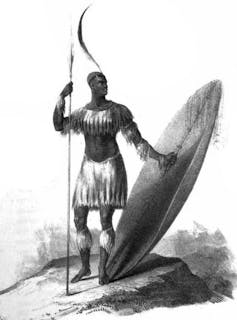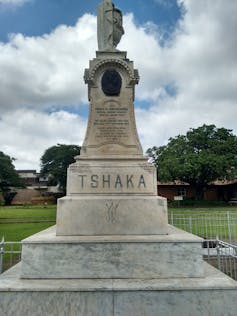The Jew in King Shaka’s court: How a 19th-century castaway shaped a Zulu leader’s legacy
The memoir of Nathaniel Isaacs, a Jewish merchant who found himself shipwrecked in what is now South Africa, influenced Shaka’s long-lasting fame abroad.

Gales tore at the Mary’s sails, and surf crashed across the brig’s deck. Seventeen-year-old Nathaniel Isaacs tied himself to a railing to avoid being washed overboard. The Mary’s rudder soon splintered against a rocky bar at the entrance to Natal Bay – what is now Durban, South Africa. Helpless to maneuver, the ship took on water.
It was Oct. 1, 1825. Isaacs, a Jewish apprentice merchant from England, loosed the rope around his waist and jumped for his life, landing on the edge of the Zulu kingdom.
Though his name is virtually unknown today, Isaacs went on to play a pivotal role during the period of first contact between the Zulu and Europeans. His widely reviewed 1836 memoir, “Travels and Adventures in Eastern Africa,” offers an eyewitness account of the Zulu under the indomitable King Shaka, who reigned from the 1810s to 1828. As I learned while researching my 2025 book, “The Jew Who Would Be King,” Isaacs’ writing shaped the mythology around Shaka Zulu, who endures as a Black nationalist icon.
A South African airport is named after Shaka, and the country’s Heritage Day is held on the supposed date of his assassination. But his fame stretches far beyond.
He has been name-checked in hip-hop culture for decades, including by Nicki Minaj and Travis Scott. An enormous sculpture of Shaka marks the now defunct Shaka Zulu nightclub in London, while a bar keeps his name alive in Germany. In the U.S. he lends his name to a streetwear brand, and his fearsome scowl adorns stickers and T-shirts. Recently, a South African miniseries, well-received by scholars, has revived his legacy for a new generation.
‘Lost tribe’ speculation
The fact that an Anglo-Jewish castaway helped forge Shaka’s legend seems surprising today. But in 19th-century England, this unlikely pairing would have made perfect sense.
The prevailing pseudoscience of the time concluded that Jews and Africans shared the same imagined racial essence. Given this fanciful equivalency, British voyagers and missionaries “found” the lost tribes of Israel wherever they looked, whether among the Native populations of North America or Indigenous peoples in Africa.

Isaacs himself suspected the Zulu of having a Jewish origin. In one letter, he described Shaka as possessing facial features that revealed “a Hebrew expression” – wishful thinking that echoed a wider cultural belief.
In other ways, Isaacs was a sober observer, describing Zulu politics, military tactics, family dynamics and rituals. In his memoir he describes Shaka as a powerful empire-builder who shrewdly assimilated conquered tribes and territory into his realm – large portions of what is today eastern South Africa. Oral histories confirm Isaacs’ assessment, with one Zulu witness noting that Shaka “established colonies like the Europeans.” According to another, the Zulu king welcomed Isaacs and “deliberately made friends of the first settlers” who washed up on Zulu lands.
‘Savage’ stereotypes
Isaacs made the most of Shaka’s hospitality – a sharp contrast to the king’s supposed ferocity, which remains a core part of Shaka’s legend.
On his first visit to the “sanguinary chief,” as Isaacs referred to Shaka, he witnessed the king order the seizure of three disobedient subjects. Their necks were broken and they were dragged away to the bush to be impaled, their bowels punctured. Some scholars believe Isaacs sensationalized Shaka’s violence – such as historian Carolyn Hamilton – yet assert that “Travels and Adventures” remains one of the most valuable sources of Shakan history.
Zulu witnesses also emphasized Shaka’s brutality. According to Magidigidi, who was born during Shaka’s reign and served as a mat-bearer, a kind of military page, the king was known as “the wrong-doer who knows no law.”
Europeans commonly exaggerated the cruelties of African leaders, often portraying them as “savages.” To many colonial writers of the time, reason, science, private property and commerce marked “civilization.” Irrationality, superstition, communal living and barter marked “savagery” – though they believed cultures and individuals could progress from one state to the other.
Isaacs detailed Shaka’s “savage propensities,” indicating that he saw his own culture as superior. Chauvinism can, of course, easily transmute into coarse racism. Yet he also treated the Zulu with admiration, praising men and women for their athleticism, agility, bravery, cleanliness, discipline and hospitality.
Racial pseudoscience
Perhaps Isaacs’ praise of the Zulu derived in part from his Jewish identity; he too would have been dismissed as “savage” in England. As historian Derek Penslar writes, Jews were imagined as “crass and venal, lacking honor and virtue, in thrall to a slave religion or unrestrained passion.”
The presumed inferiority of Jews meant that European Christians often considered them “black,” both metaphorically and physically. Physician and early anthropologist James Cowles Prichard wrote that depending on the climate in which Jews lived they could become swarthy, even black. One implication of Prichard’s belief was that environment and culture shaped race, which was thought to be a more mutable category of identity than people often consider it today.
Cultural historian Sander Gilman summarized this curious history: “In the eyes of the non-Jew who defined them in Western society the Jews became the blacks.”
H. Rider Haggard, the English novelist and former civil servant in South Africa, played on this imagined connection between Jews and Black Africans. “King Solomon’s Mines,” published in 1885, depicts a breakaway Zulu enclave as the source for the biblical King’s riches.
Isaacs’ “Travels and Adventures” avoids such wild speculation, but he does note King Shaka’s fascination with Judeo-Christian theology. One night, Shaka invited him to speak about faith. “The religion of our nation taught us to believe in a Supreme Being,” Isaacs explained, a god who “created all things, and was the giver of light and life.” Shaka “seemed as if struck with profound astonishment” when Isaacs regaled him with the biblical account of creation.
Kingly legacy
Isaacs was equally spellbound by the Zulu. He hunted elephants for ivory, established a homestead and distinguished himself in battle. Shaka rewarded him with a praise name – a great honor – and the title of “induna,” a chieftain or headman.
Isaacs, in turn, lauded Shaka’s highly disciplined and militarized kingdom. Following his lead, Haggard lavished praise on Shaka’s genius, noting that the Zulu military was among “the most wonderful that the world has seen.” More recently, Marvel’s “Black Panther” features a former king of an isolationist African state jealously guarding its military supremacy. The king’s name? T’Chaka.

African writers have likewise shrouded Shaka in legends of martial prowess. Zulu scholar, author and exiled African National Congress activist Mazisi Kunene’s epic “Emperor Shaka the Great,” published in 1979, hews to Isaacs’ depiction of a fierce yet noble Shaka.
Isaacs even appears in Kunene’s work, which advanced Zulu nationalism in the face of apartheid. The titular King Shaka declares that Isaacs “possessed true humanity,” and one of Shaka’s advisers counsels that Isaacs should be considered a Zulu and no longer be treated as “a foreigner or white man.”
Two hundred years after Isaacs’ shipwreck, much of Shaka’s legend can still be traced back to the travels and adventures of a teenage Jewish Zulu chief.
Adam L. Rovner does not work for, consult, own shares in or receive funding from any company or organization that would benefit from this article, and has disclosed no relevant affiliations beyond their academic appointment.
Read These Next
Citizenship voting requirement in SAVE America Act has no basis in the Constitution – and ignores pr
The House has passed a bill to require proof of citizenship for voting. Although it likely won’t become…
How the 9/11 terrorist attacks shaped ICE’s immigration strategy
The growth of today’s aggressive immigration tactics traces back 25 years, when enforcement took on…
Exiled Iranians and Venezuelans may well support regime change – but diasporas don’t always reflect
Diasporas are often treated by media and policymakers as monolithic blocs, but the reality is more complicated.






